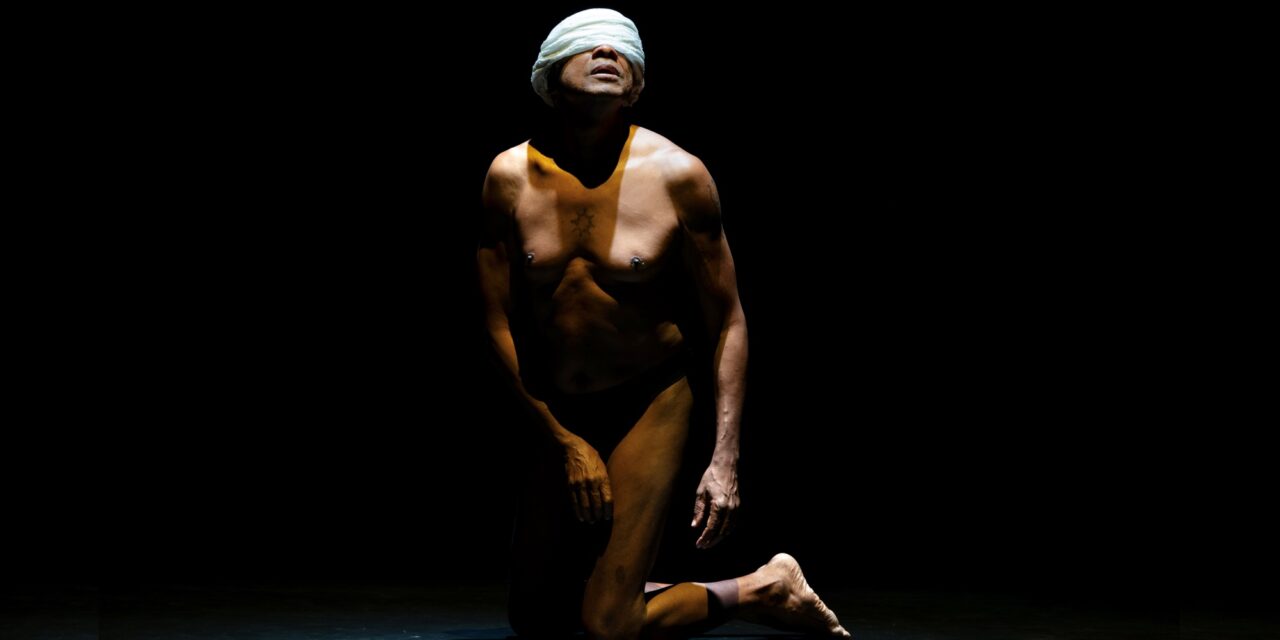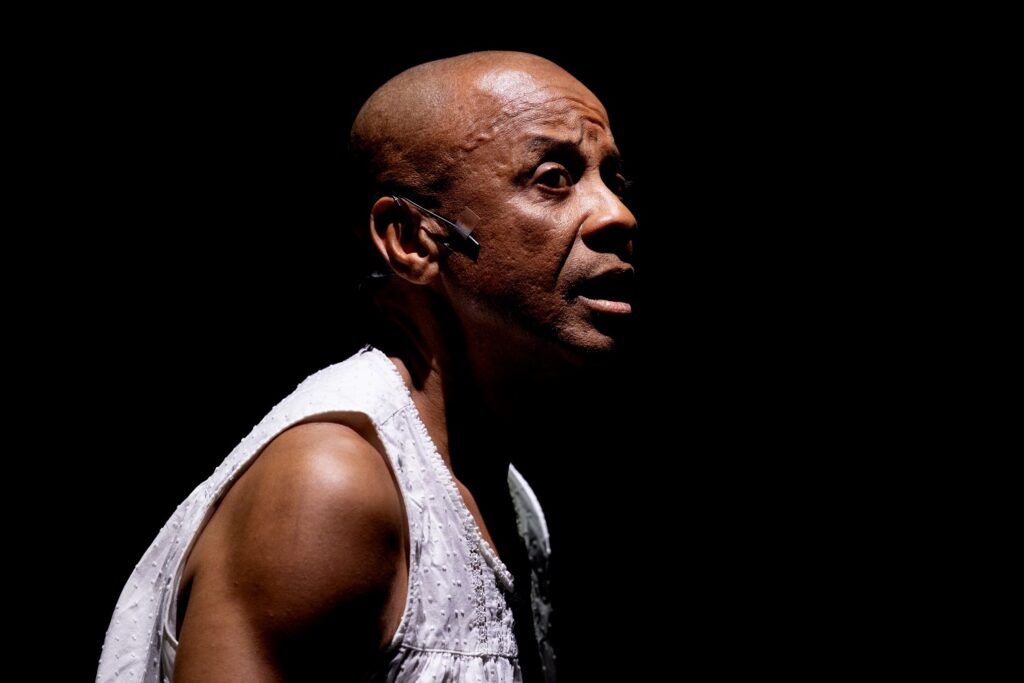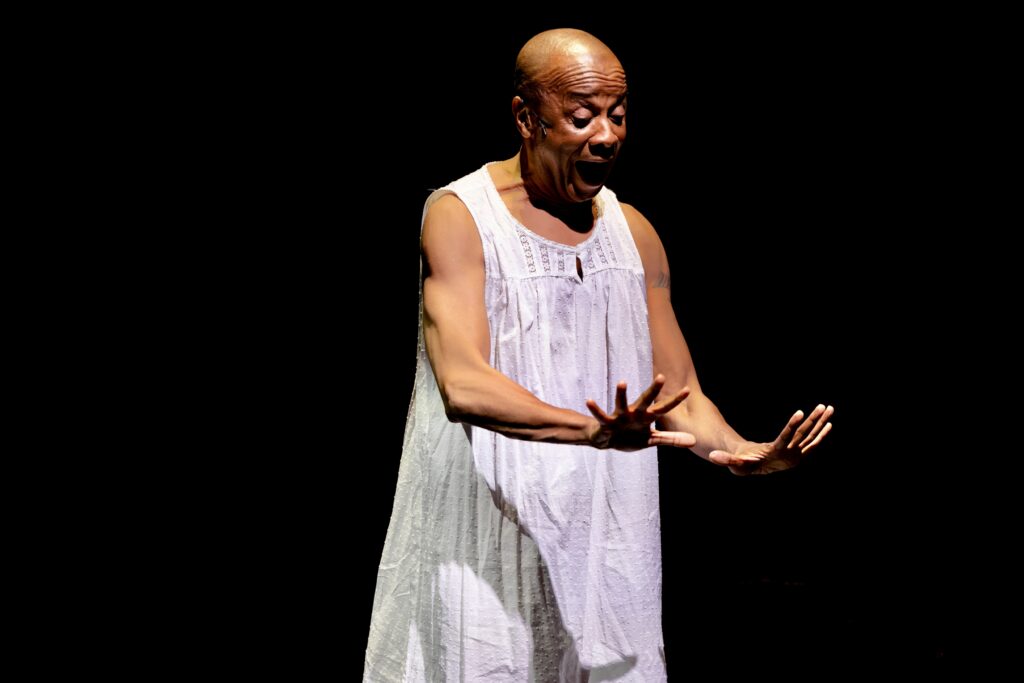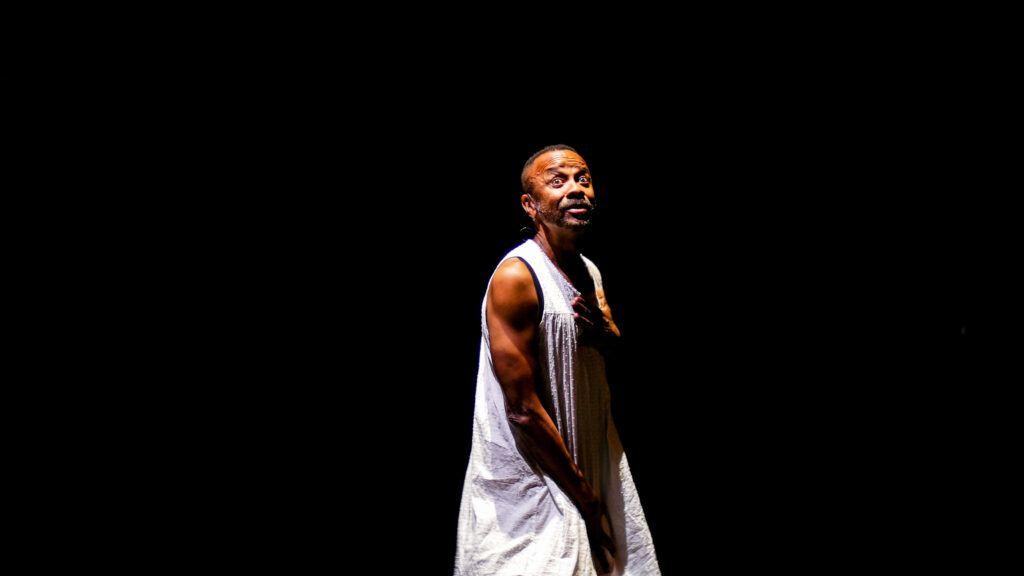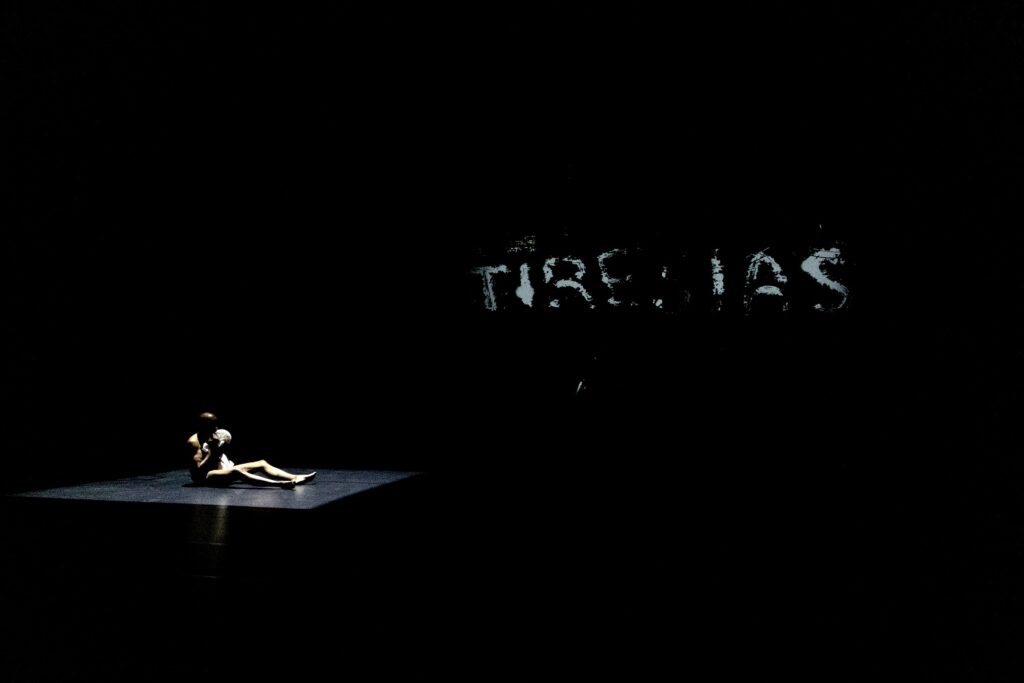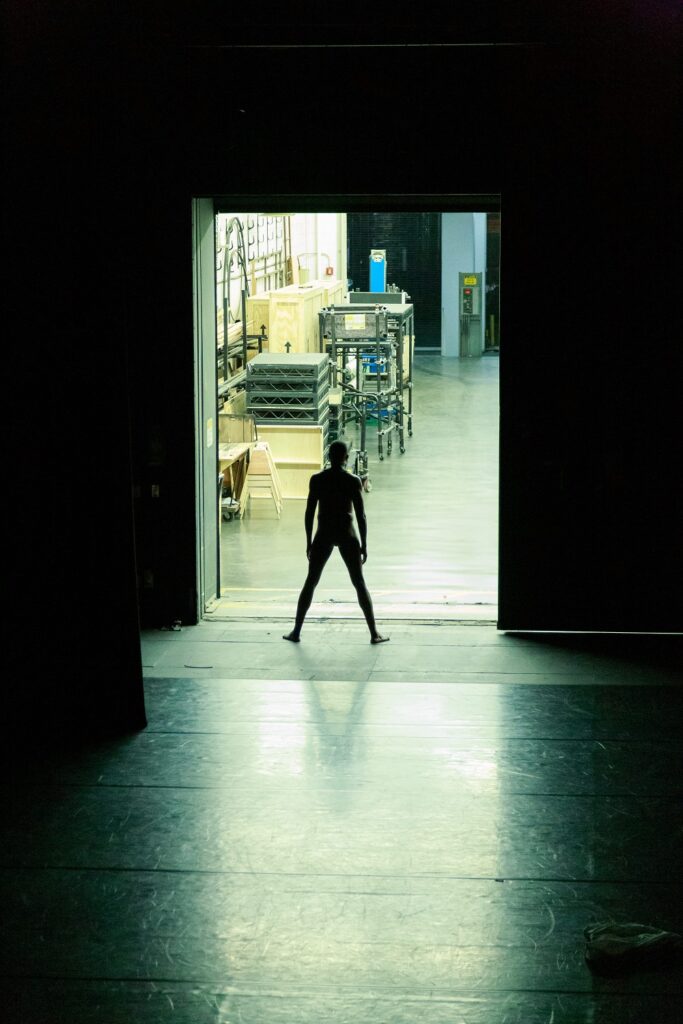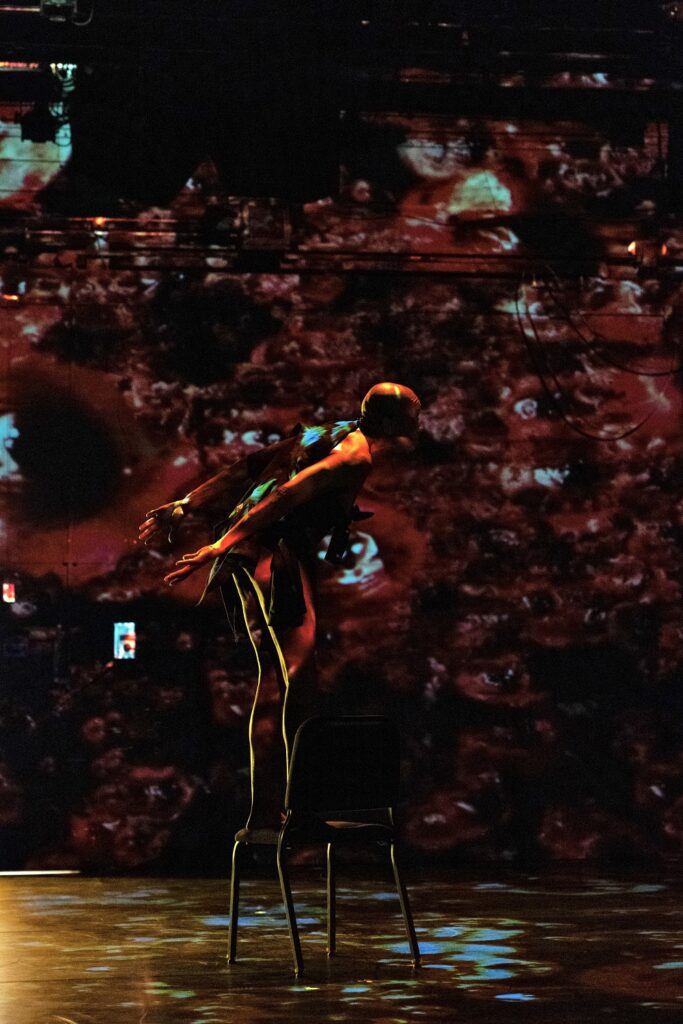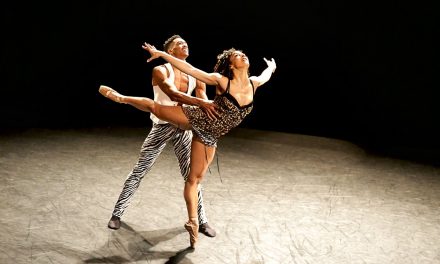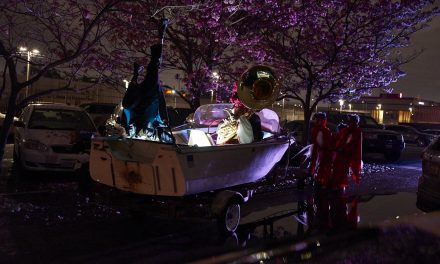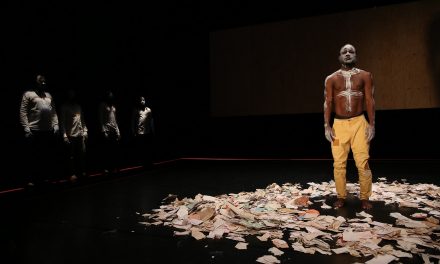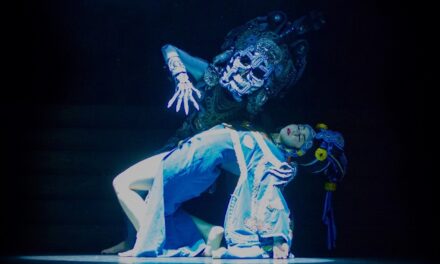A bright flash of light. The world changes. Previously curled up in the White House, the first female president of the U.S. wakes up in a Black man’s body forced to confront her privileges and ideologies as a right-wing white woman.
Paul Outlaw’s BBC (Big Black Cockroach), directed by Sara Lyons, is an intense interrogation of the hyper-sexualization of Black men, taking inspiration from Franz Kafka’s The Metamorphosis to transform the REDCAT stage into a space of isolation. Outlaw’s performance is captivating and heavy-hitting, pulling the audience into a rollercoaster of self-reflection whether they are ready for it or not.
The show, which ran from June 20 – 22, incorporates scenes from inside Terry’s surveillance cell — portrayed by a single rectangular light on the ground — mixed with more casual addresses to the audience. Outlaw includes these moments to ease the tension, but only slightly. He marks various transitions in the piece by sharing the story of Tiresias of Greek mythology, recontextualizing his narrative into the world of Antebellum slavery and later as Tyre, a modern-day young Black man used for sex. Together, the two sides of BBC weave a tapestry of America’s history of white violence and the vulnerable ache for liberation.
Outlaw’s vocal performance shifts from a feminine southern drawl (inspired by Majorie Taylor Greene) to his natural voice with such speed that it makes your head turn. When Terry, the white woman in question, discovers her transformation into a Black man, Outlaw’s detailed and specific movement creates a daunting tone. The realization is slow, first touching the nose, shaking his hands to the top of his head, and down to his groin. Seeing his Black skin as Terry, he begins to rub it off. The laughter from the audience quickly subsided and the room grew starkly silent. The act of rubbing away a skin color was a poignant choice for Outlaw that cemented the daunting journey ahead.
The erratic movement in the cell dissipates as the days pass. Terry’s assimilation into her new normal is documented by Outlaw’s shaking hands growing still and sensual until the embodiment of her delirium brings him to the ground. He sings softly on his back, turning his head with bewildered eyes piercing through the audience as if shining a light at each face. This is his peak.
The show’s central theme becomes apparent when the size of the cell multiplies to incorporate the entire stage. Outlaw, as Terry, grows frustrated by the concept of the BBC, drawing a direct correlation between the exploitation of Black male sexuality to the history of exploitation of Black bodies. He runs forward to the audience and the house lights go up. He introduces a new, comical interlude to the intense show. However, instead of metaphorically getting the audience to address their complicities and relation to racism, he does it directly with a Q&A.
In the final section of BBC, Outlaw gives it his all. In collaboration with the lighting design of Chu-Hsuan Chang and projections by Hana S. Kim, the stage continues to evolve. The strobe lights make his movements slow motion. He rips out his eyes and the flames of a burning building projected on the back wall evolve into a swirl of red eyes. The sliding door to REDCAT’s backstage opens and he lingers forward.
Ovid’s Metamorphoses ends with death, but Outlaw does not want another show ending in another tragic Black death. Instead, a new morphing takes place. He transforms into a Howard professor, though it is not explicitly stated. His vocal performance once again shifts appropriately, creating a stark difference between the characters in his body.
He repeatedly shouts, “I’m here” and concludes with Tiresias’s name, but spoken to emphasize, “Tyre… see… us.”
There are many ways to interpret his final breath. I gravitated to the echoing final syllables, “See us,” letting the overarching theme of complicity ring. Outlaw continually questions the audience, indirectly and directly, “What are you going to do about what you saw?” It is not just an isolated concern, but a communal one.
BBC is a guttural call for people to pay attention to the exploitation and discrimination of Black bodies. The history of American slavery echoes today in our carceral system, and Outlaw proposes, through the fetishization of Black men. It perpetuates ownership, viewing the Black body as an object. By ripping out his eyes, showing a white woman’s fascination with a Black penis, and even rubbing his skin, he shows people what this objectification is really doing — what it really means: It is tearing him apart.
The show is a profound proclamation that says, “I am here.” Not “that” or “it” or “BBC” or “appendage” or anything else dehumanizing. I am here, Outlaw says.
To learn more about Paul Outlaw, please visit his website.
For more information about REDCAT, please visit their website.
Written by Steven Vargas for LA Dance Chronicle.
Featured image: Paul Outlaw in “Big Black Cockroach” – Photo by Angel Origgi courtesy of REDCAT.

